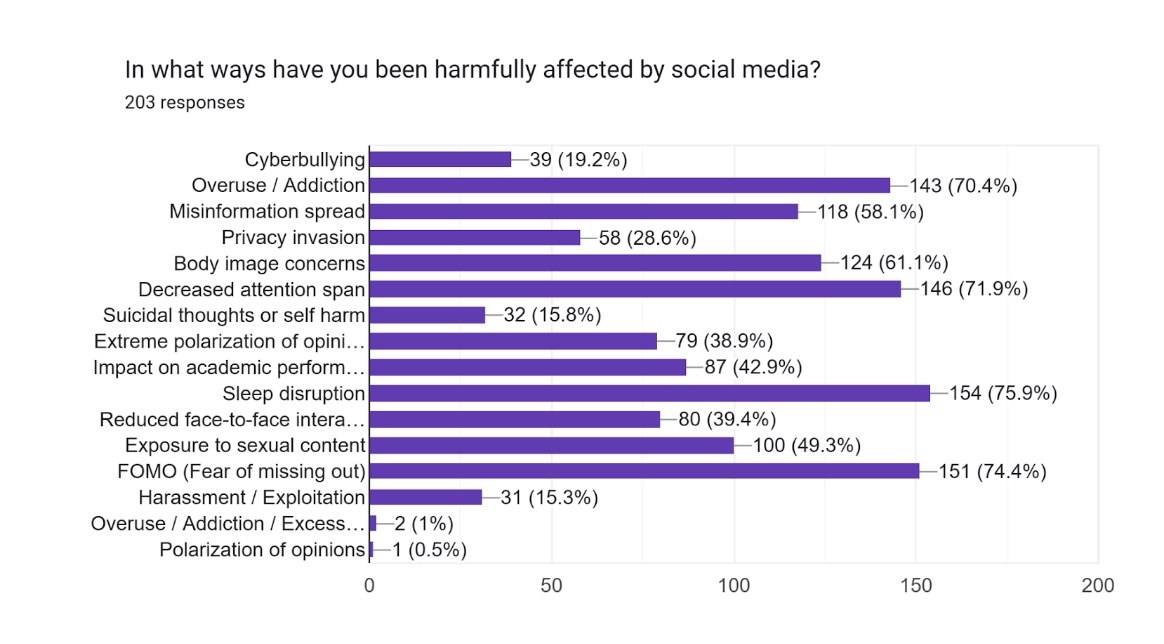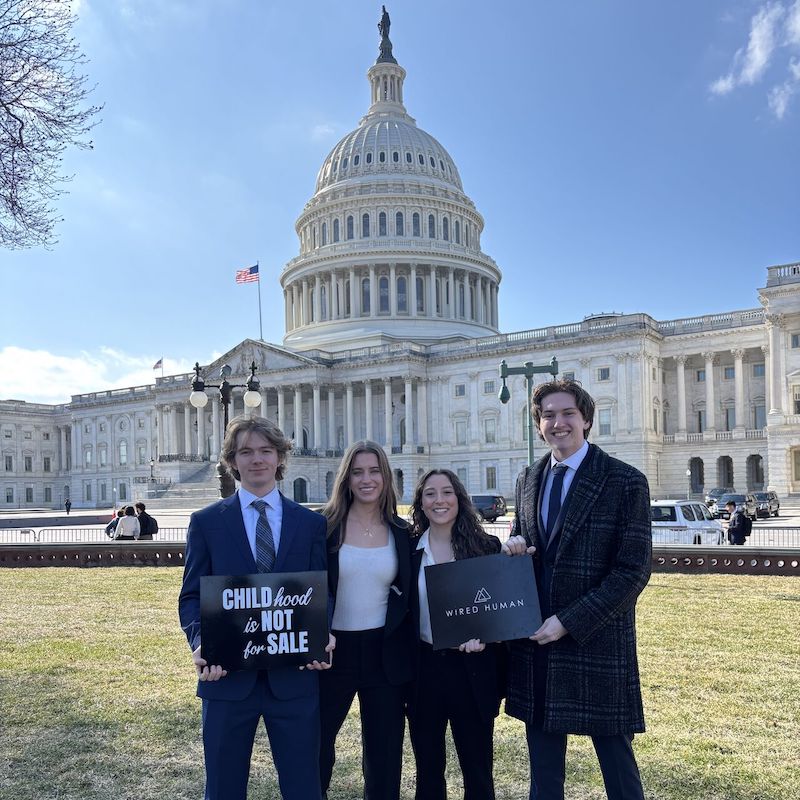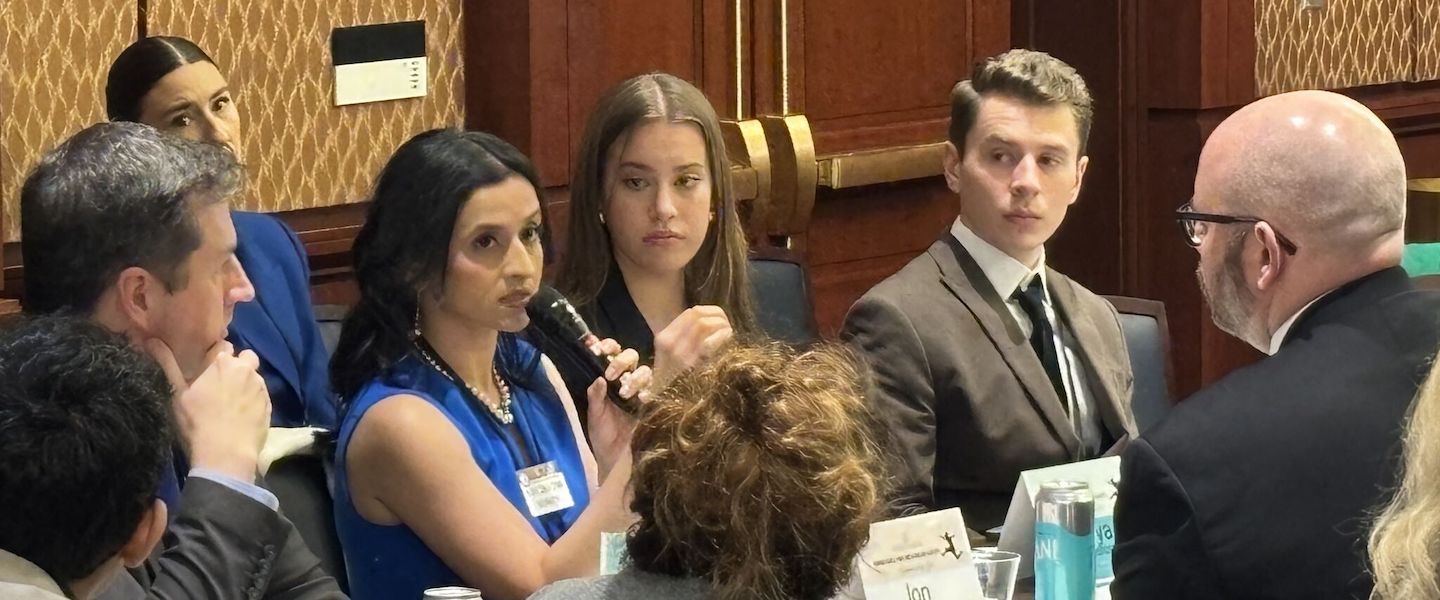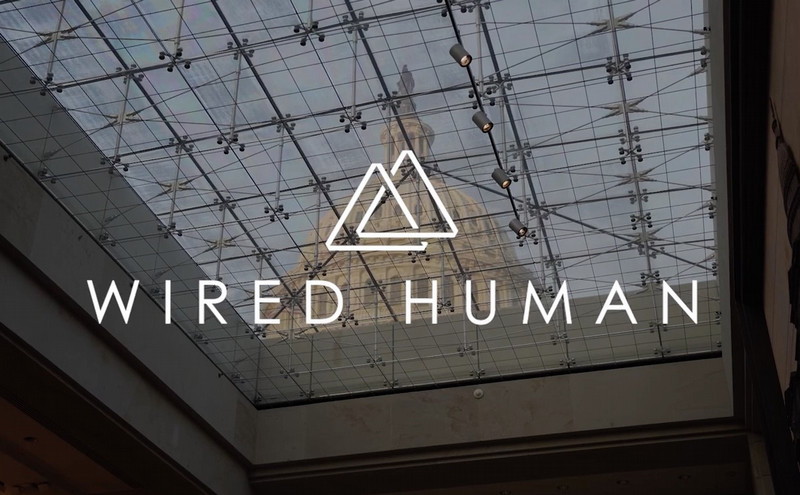From a general class prompt to advocating on Capitol Hill, Global Honors catalyzes students to shape national conversation on digital safety
What started as a class project led to a group of Belmont juniors joining national efforts to advocate for online safety in youth and presenting their research in Washington, D.C.
“I never imagined our class project would lead to this,” said Sam Wallace, audio engineering technology major. “It was surreal, but it also showed me how powerful youth voices can be when we’re invited into the conversation.”
Dark Side of Social: Uncovering Social Media’s Harm
Belmont’s Global Honors Program empowers students to shape their own learning through hands-on projects, global travel and courses that encourage collaboration across disciplines. A key part of the experience is the Honors Scholar’s Collaborative, where students plan and carry out their final research projects.
This spring, Wallace teamed up with fellow juniors Maya Englehorn, Nina Greco and Andrei Pop in Dr. Jeff Overby’s collaborative course, “Value Creation: The Business of Social Innovation & Design.”
Each student started by identifying a major social issue and proposing a practical solution. As the class began sharing ideas, these four realized they had something in common: deep concerns about how social media is affecting their generation.
As members of Gen Z—the first generation to grow up fully immersed in social media—they understood the issue from personal experience. They’ve seen how it shapes minds, behaviors and even mental health.
“It was personal,” said Englehorn, a global leadership studies major. “We’ve grown up with social media. We’ve seen the effects on our friends, our younger siblings and ourselves. It’s not abstract — it’s our reality.”
Once they chose their topic, the group focused on gathering insights. After searching for local nonprofits with a mission that related to their topic, the team found Wired Human, a Nashville-based nonprofit advocating for online child safety. They administered a survey for Wired Human that gathered over 200 responses from high school and college students. Their findings painted a clear picture: social media has a serious impact on young people’s lives.
“I felt like it wasn't just about social media’s effect on my life anymore,” said Wallace. “There was a feeling of being a part of something much bigger, and maybe even more sinister. I considered myself very lucky after gathering all the data.”
Their results were eye-opening. On average, students opened their first social media accounts around age 13 — some as young as 6. Many respondents also encountered harmful content at early ages, including cyberbullying, unrealistic beauty standards and explicit material.

The students ended their survey with a thought-provoking question: Does social media truly deliver on its promise of entertainment and meaningful connection? Their findings showed that most participants reported experiencing at least one harmful side effect from their social media use.
- 46% of participants were exposed to sexual/not-safe-for-work content online
- 72% of those surveyed admitted to overusing social media
- 71% reported sleep deprivation due to social media use
- 71% reported a decrease in attention span
For Greco, a music business major, the experience underscored the complexity of digital culture. “We obviously all recognized that it was a very prominent issue, but we didn't realize the depths of it and how it's worsening for younger generations,” she said. “Even people our age who got social media when they were 7 or 8 are so intertwined with it that they can't separate their lives at all. This is a serious addiction that is so normalized.”
From the Classroom to Capitol Hill
 Jason Frost, the CEO of Wired Human, invited the students to join the nonprofit’s Youth Alliance, consisting of high school and college students who are passionate about advocating for online child safety. Frost also invited the team to present their research during the Roundtable for Child Online Safety in Washington, D.C.
Jason Frost, the CEO of Wired Human, invited the students to join the nonprofit’s Youth Alliance, consisting of high school and college students who are passionate about advocating for online child safety. Frost also invited the team to present their research during the Roundtable for Child Online Safety in Washington, D.C.
In D.C., the Belmont students joined with child safety advocates, medical professionals and legislators across the country, including Senators Marsha Blackburn (R-TN) and Richard Blumenthal (D-CT). The event aimed to build momentum for the Kids Online Safety Act (KOSA), a bipartisan bill designed to hold social media companies accountable for protecting young users.
Global Honors Opens Doors
The flexible, interdisciplinary nature of Belmont’s Global Honors Program allowed these students from vastly different majors — legal studies, music business, global leadership and audio engineering — to collaborate on an issue that transcends academic boundaries.
“Being part of the Honors College motivates you to pursue something beyond your degree,” said Pop, who plans to attend law school. “This project wasn’t in our majors, but it mattered deeply, and we made it matter nationally.”
Since their trip to D.C., the team has continued advocating for safer digital spaces. They’ve stayed involved with Wired Human’s Youth Coalition, presented at Belmont’s inaugural SPARK Symposium and even made individual podcasts appearances to discuss online safety.
“I feel strongly that everything we do in the classroom should have a direct correlation with the real world,” said Englehorn. “And I think Belmont does a great job of making that happen.”
Shape your own learning in Belmont's Global Honors Program


